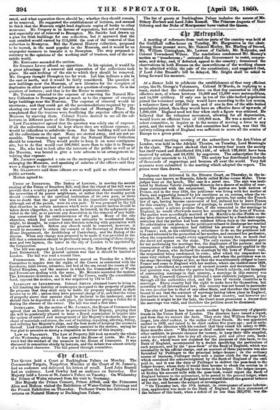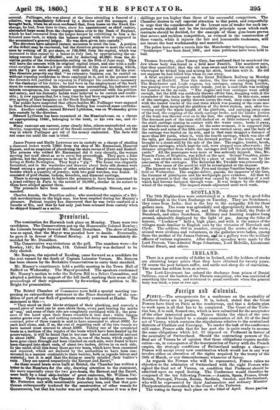311.rtruitutto.
A meeting of reformers hum various parts of the country was held at the Guildhall coffee-house on Tuesday, Mr. Hargreaves in the chair. Among those present were, Mr. Samuel Morley, Mr. Marling of Stroud, Mr. William Coningham, Mr. Lawson of Carlisle, Mr. Helyoake, and Colonel Townahend Wilson. The resolutions condemned Mr. Massey's motion as " treacherous ; " entreated the Government to resist, compro- mise, and delay, and, if defeated, appeal to the country; denounced the observations in both Houses on the unworthiness of the working classes to be admitted within the pale of the constitution; and suggested that, if Lord John Russell's bill be delayed, Mr. Bright shall be asked to bring forward his measure.
At a dinner held to celebrate the establishment of that very efficient corps, the St. George's Volunteers, Colonel M`Murdo, in replying to a toast, stated that the volunteer force on that day amounted to 124,000 effective men, of whom between 10,000 and 12,000 were metropolitan; and 14,000 Ltillery. If only one in ten of the able-bodied population joined the volunteer corps, they would have according to the last census, a volunteer force of 550,000 men, and if one five of the able-bodied population joined, then they would have an effective force of upwards of 1,000,000. England need not fear when such a figure was attained. He believed that the volunteer movement, allowing for all depreciation, would leave an efficient force of 100,000 men. He was a member of a select committee, to inquire as to the means of moving a force to any point, and the result to which that committee had come, was that the railwry rolling-stock of England was sufficient to move all the armies of Europe to a given point.
The annual meeting meeting of the subscribers to the Art-Union of London, was held in the Adelphi Theatre, on Tuesday, Lord Monteagle in the chair. The report showed that in twenty-four years the society has itself raised and distributed 264,143/., of which 138,6621. have been received by artists, and 64,6231. by engravers. The subscription for the auleent yearamormte to 14,1881. The society has distributed hundreds of thousands of engravings end bronzes all over the world. Very full accounts were submitted to the meeting which adopted the report. The prizes were then drawn.
Judgment was delivered in the Divorce Court, an Thursday, in the in- teresting case known as Simonin, falsely called Malac versus Malec. Three judges were on the bench. The case is a novel one. The suit was insti- tuted by Madame Valerie Josephine Simonin for a decree of nullity of mar- riage contracted with the respondent. The parties are both natives of France, and in the year 1854, the petitioner was living with her mother at Paris, and supporting herself by her exertions as an actress, when the re- spondent, M. Leon Malac, a son of respectable parents, but under the French law of age, having become enamoured of her, induced her to leave France for this country, for the purpose of marriage, to avoid the intervention of parents, under a solemn promise that, if she consented to the marriage in England, he would afterwards marry her according to the laws of France. The parties were accorffingly married at St. Martin's-in-the-Fields on the day after their arrival, a licence having been obtained by a fraudulent repre- sentation that the parties had been resident fifteen days in the metropolis. No cohabitation took place, as the petitioner refused to discharge her marital duties until the respondent had fulfilled his promise of marrying her in France; and, on his exhibiting a reluctance to do so, the petitioner left him and returned to the protection of her mother, and resumed her profession, when the respondent sought every opportunity to annoy her, so much that she dared not appear on the stage. The only excuse the respondent gave for not performing the marriage was, the displeasure of his parents; and in consequence of the conduct of the respondent, the petitioner applied to the Courts of France, who declared the marriage by the laws of France void, the respondent being condemned in costs; which the respondent be- came very violent, frequenting the theatr, and when the petitioner was on the stage throwing things at her, so that she was ultimately obliged to leave France and come to England with her mother, where she resided since 1858, gaining a livelihood as a restorer of ancient records and documents. The real question was, whether the peirties being French subjects,. and incapable of contracting marriage in that country, a marriage in this country was valid. Sir Cresswell Cresswell delivered a most elaborate judgment, going through all the authorities cited, and the laws of various countries as to marriage. Every country had the right to make laws for themselves, but according to all international law, this country was not bound to surrender its own peculiar law to that of any other State, and therefore tbe Court felt bound to say that the contract of marriage having taken place in England, the parties must be bound by the law of that country, and however un- fortunate it might be for the lady, the Court must pronounce a decree that the marriage was valid, and therefore the petition must be dismissed.
The city of London has been much excited by the discovery of gigantic frauds in the Union Bank of London. The directors have issued a report, and from that we extract the facts. They state that William George Pul- linger, late chief cashier, is the author of these frauds. He was appointed cashier in 1839, and raised to be chief cashier five years ago ; and so satis- fied were the directors with his conduct that they raised his salary to 6001. three months since. " His duties as chief cashier were to superintend the other cashiers, to procure cheques for money, to keep their tills supplied, and it devolved upon him to pay all cheques, gold and silver coin, bank- notes, 80., which were not required for the purposes of this bank, to the Bank of Englend, accompanied by a docket specifying the particulars of each payment, and by the pass-book' of the Bank of England, which was necessarily in his official charge, and an account of these payments was also furnished by Pullinger to the principal ledger1ieeper ; in the ordinary course of business, Pullinger daily sent ajunior clerk for the pass-book, which contained the acknowledgment by the Bank of England of the cash paid in, and it was the duty of Pullinger to deliver the pass-book to the ledger-keeper, whose duty it would then become to check the entries in it against the Bank of England by the items in his ledger. The ledger-keeper, on finding his account tally with the pass-book, would report the Bank of England balance to the accountant, to be posted in the general ledger, when any error in the Bank of England balance would disturb the general balance of the day, and become the subject of investigation. " On Thursday last, the 19th instant, in consequence of some informa- tion, application was made to the Bank of England for their statement of the balance of this bank, when a deficit of no less than 263,070/. was dia- covered. Pullinger, who was absent at the time attending a funeral of a relative, was immediately followed by a director and the manager, and brought back, when he at once confessed that, from losses on the Stock Ex- change, he had, from time to time, since his appointment as chief cashier, charges large sums from the c:rges taken over to the Bank of England, which he had concealed from the ledger-keeper by exhibiting to hint a fa- bricated pass-book, in which the balance agreed with what it appeared in the accountant's general ledger. He was then given into custody.'
The directors have adopted instant measures to meet the less, A portion of the deficit may be recovered, but the directors propose to meet, the evil at once by writing off 21. per share, or 120,0001. from the capital, which was increased to that extent by a bonus in July last, by appropriating the ex- isting reserve fund of 100,0001., and by deducting 40,000/. from the di- visible profits of the twelvemonths ending on the 30th of June next. This will leave the concern with its original capital intact, and also with, a suffi- cient surplus to declare a 5 per cent dividend at the next meeting, which, with the 7t per cent already paid, will make 121 per cent for the year. The directors .properly say that "no extensive business can be carried on without reposing confidence in those employed in it, and in the present case the directors felt justified in reposing in Pullinger the confidence necessary for the discharge of his duties ; he had been is the employment of the bank since its commencement, hie attendance was unremitting, his industry and talents conspicuous, his expenditure appeared consistent with his position and salary, and his domestic habits were believed to be correct and credit- able ; it now appears that for a long time he had been engaged. in an exten- sive system of time bargains on the Stock Exchange."
The public have suspected that others besides Mr. Pullinger were engaged in these fraudulent transactions. This feeling has received some confirma- tion. Another cashier, named Edward Lyttleton, was on Wednesday given into custody by the directors. Edward Lyttleton has been examined at the blansionhouse, on a charge of appropriating 12401., belonging to the bank, to his own use, and re- manded.
Many rumours are current, some clearly false, others contradicted on all.. thority, respecting the extent of the frauds committed on the bank, and the way in which Pullinger got rid of the money embezzled. The facts will not come out with the case is tried.
James Pearce and Emily Lawrence are in custody on a charge of stealing a diamond locket worth 12001. from the shop of Mr. Emmanuel, Hanover Square, and on suspicion of plundering the store rooms of Hunt and Reakell. The pereons who robbed Mr. Emmanuel did it very cleverly, the woman moving her muff about fie as to cover her proceeding*. They gave a false address, but the shopnien swear to both of them. The prisoners have been living at Stoke Newington. They kept a "gig." The house was elegantly furnished, and in the wardrobes and drawers about forty silk dresses were found among a great profusion of other articles of female wearing apparel ; besides which a quantity of jewelry, with two gold watches, was found. It consisted of gold chains, lockets, bracelets, and diamond earrings, There is strong reason to believe the prisoners to have been concerned in a jewel robbery in Paris to the extent of 10,0001” similar in its nature to those here alleged against them.
The prisoners have been examined at Marlborough 'Streeet, and re- manded.
Charles &mots, the Brazilian sailor, who murdered the captain of a Bri- tish merchantman on the high seas, has been respited during her Majesty's pleasure. Patient inquiry has discovered that he was twice confined as a lunatic at Rio, and that he had only just been released from custody when he shipped himself as a sailor.



























 Previous page
Previous page